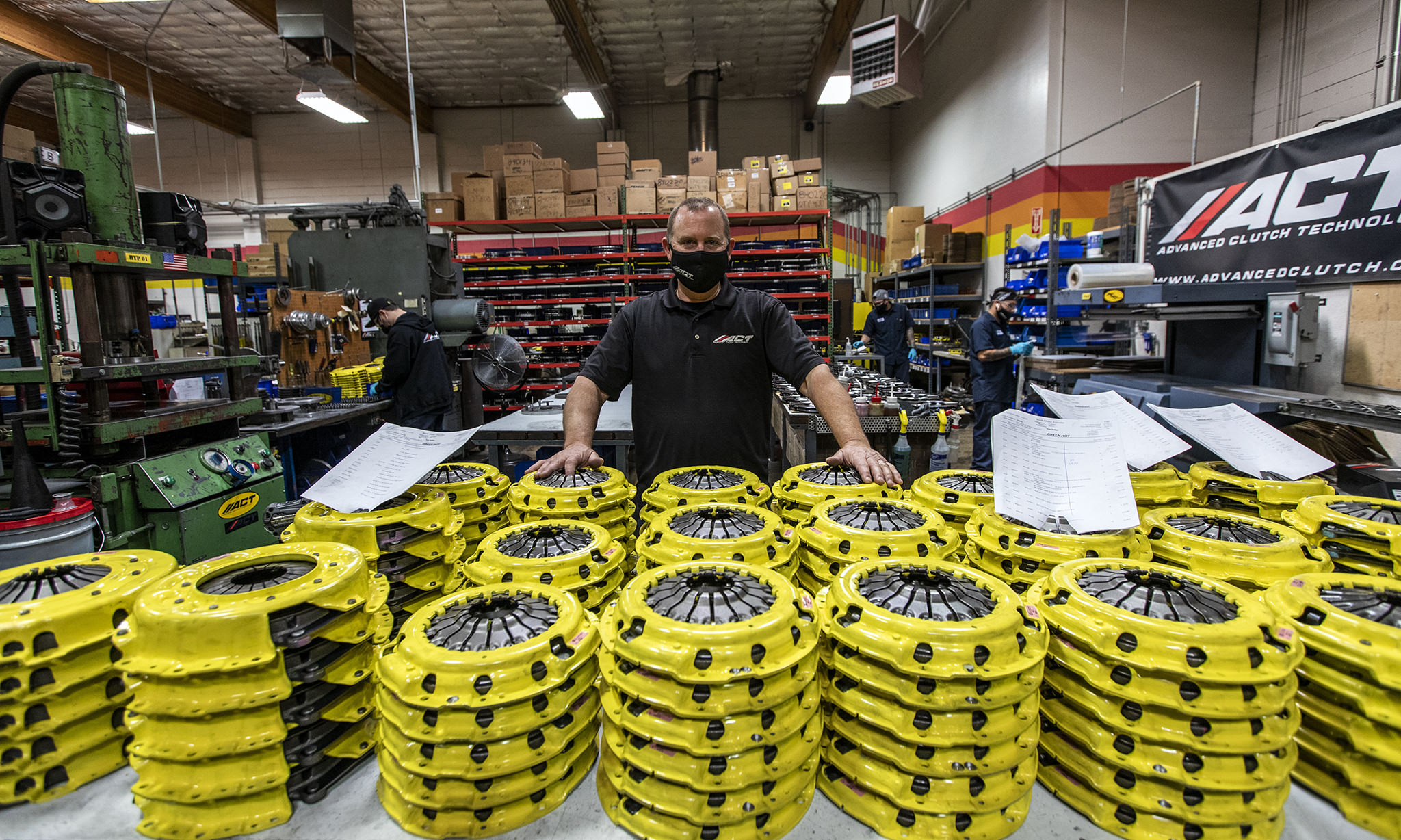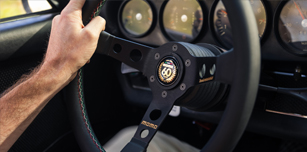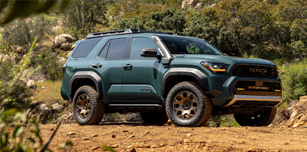- Advanced Clutch Technology is located in Lancaster, CA in a 22,000 sq ft facility where they manufacturer their own diaphragm springs while all clutch kits and flywheels are designed, tested and assembled in-house.
- Founder of ACT, Dirk Starksen, worked his way up from being an assembler and machinist to general manager at Kennedy Engineered Products until he started ACT as a side gig in 1994.
- Born from racing, ACT has helped supply driveline components to some of the most powerful drag racers, competition drift cars and land speed record holders in history.


LONG LIVE THE MANUAL
It’s hard for us to accept manual transmissions are a dying breed. In the U.S., less than 3% of new cars sold are equipped with stick shifts. Even today’s most sought-after sports cars like the Nissan GT-R, Porsche 911, and C8 Corvette all sport dual-clutch automatic, but can we blame manufacturers, though? Generally, more advanced DCTs shift faster than manuals. We also can’t forget the fact that newer drivers aren’t learning how to use that third pedal like many of us did when we were younger. Despite all this and having been a “driving enthusiast” for the better part of the last 20 years, there’s something that I can’t experience in an automatic (no matter how quickly it might shift). Not just having full control, but it’s also the inherent fun from banging through gears while accelerating, downshifting into third on the highway, and heel-toeing before a sharp corner that’s irreplaceable. So, while the majority of OEMs are ditching MTs, there’s still a huge number of five- and six-speed-equipped vehicles on the road that continue to attract enthusiasts of all types, and why Advanced Clutch Technology (ACT) has grown into being one of the most innovative and successful driveline component specialists in the industry.




CLUTCHES FOR MODIFIED CARS
Choosing a clutch and flywheel on that modified car of yours can be difficult as there are so many configurations and brands to choose from. For stock cars, it’s pretty easy to default to an OEM replacement as they’re typically the cheapest option; however, if you’re like many of us and adding more power, forced induction upgrades, and tuning for maximum performance, it pays off to do your homework and select a brand that is reputable and offers the products best for your build. Just digging into a brief history of ACT, you can already get a sense that they know what they’re doing. Having been around for almost 30 years, they continue to make a name for themselves as they don’t just rebuild or modify parts but engineer and assemble everything in-house to perform better than stock and often spec’d to handle intense racing conditions.
Note: I’ve known about ACT since I got my start in the industry in the early 2000s, having installed one of their clutch and flywheels in an older VW GTI project car. Back then, they already had a winning reputation. Still, it wasn’t until I paid a visit with them earlier this year when I fully began to comprehend just what makes them tick and how they’re a step above the rest.





BORN FROM DRAG RACING
I received a full facility tour from founder Dirk Starksen who has a fascinating history of his own.
Dirk started his career in 1979 at Kennedy Engineered Products, famous for engine adapters and clutches for older Volkswagens. The business was booming in the ’80s as the whole VW scene was blowing up with drag racing, dune buggies, sand rails, bus builds, you name it. There, he worked his way up from being an assembler and machinist to general manager until he started ACT as a side gig in 1994. He eventually left Kennedy and put all his time and energy into ACT two years later.
Dirk revealed that ACT was born from the ’90s import drag racing scene. It was a genre of cars Kennedy didn’t want to expand into, so Dirk took it upon himself to develop high-performance clutches and pressure plates for Japanese vehicles — primarily Mitsubishi Eclipse and Honda B-series engines in the beginning. Of course, this would blossom into the 2000s, where the company evolved into supporting pro drift, time attack, rally, and land speed race cars. All while applying what they learned to the hundreds of different clutch kits and flywheels that they continue to offer today.





THE ACT EDGE
ACT’s competitive and grassroots racing heritage is something we can all appreciate and already gives it an edge over other clutch companies; however, there was much more as I walked around their 22,000 sq ft facility. Dirk pointed out that the company doesn’t rebuild from factory discs or offer any stock replacement stuff, for that matter, only performance applications. He noted OEM clutch designs often make sacrifices to save on cost and aren’t rated for extra torque. He also made it clear that everything that comes out of their Lancaster, California headquarters is designed, tested, and put together there. Plus, it’s all the little details that go into manufacturing, metallurgy, engineering, and assembly that put ACT on a whole other level. There are very few instances when clutches don’t perform to the torque it’s rated because there are so many details and processes that ensure failure isn’t an option. For almost three decades, he and his team have created a vast number of clutch kits that can handle up to the majority of customers, which range from street kits to the 1000hp race guys. All the kits are SFI certified which go through stringent safety checks. ACT not just creates a part that can hold power but gets the right pedal feel, which is tested in the real world before being shipped out to customers.




DIAPHRAGM SPRINGS
Perhaps the biggest edge of ACT is that it is the only one that manufactures its own patented diaphragm springs. The clutch section that creates the force that clamps onto the disc and gives you all that torque capacity. ACT creates these from blanks and can modify their thickness and angle for various clamping loads. Without modifying and designing diaphragm springs, a clutch company is really limited in what they can do, which is why ACT often private labels diaphragm springs for other brands out there and can also do them in small batches.



ATTENTION TO DETAIL
After passing through the assembly line to watch other critical processes like the laser marking and balancing machines, Dirk walked me upstairs into the R&D department, where I met the VP of Engineering, Chris Bernal, and truly realized how complete of a manufacturer ACT was. There, I learned how Dirk strives for attention to detail which helps ACT analyze and beef up all the weak stress points, heat treat the springs to the right strength and hardness, spec the best materials, and endure copious amounts of abuse, testing, and quality control. All of this is done to ensure the clutch doesn’t fail, its life is prolonged, and its feel and engagement is everything a driver would ask for and more. This attention to detail and investment into engineering has allowed ACT to develop innovative products like modular twin-disc clutch kits and their famous one-piece Monoloc clutch collar.



ACT DEMO TRUCK COMING SOON
I wrapped my ACT tour, saying goodbye to a handful of the 45 hardworking employees before catching Dirk’s own son Andrew wrenching on a 1971 Chevrolet C20 truck in the back. Surprisingly, after supporting so many pro race teams, grassroots drivers, and big-name SEMA builds, ACT doesn’t have a resume of its own project cars. This big yellow Chevy truck won’t be something you’ll see lined up at your local drag races. However, it’ll be used as a development tool to test new products and materials for LS engines and beyond. A true testament that ACT can’t and won’t stop evolving, and perhaps also a good sign that manual transmissions aren’t going anywhere anytime soon.
Related Links
ACT Website
ACT Instagram
ACT Facebook
ACT YouTube Channel
Sam Du Instagram
Front Street Media Instagram

















